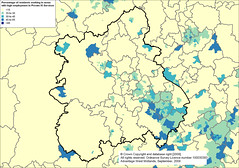
Here’s a monumental understatement – these are difficult times and finding employment is a near Herculean task. Still, when you’ve been unemployed for some time, the difficultness of the task is really irrelevant. You just have to get it done.
But getting it done doesn’t mean continuing to beat your head against the wall if the wall isn’t moving. At some point, you have to step back and reevaluate everything if you’re not making any progress. And that includes relooking at your resume.
Resume writing during a recession is fundamentally different than “normal” times. It is different for a number of reasons. First, obviously, is the far greater number of applicants for every job posting. Secondly, the uncertainty and length of this current recession is making hiring managers even more skittish than they normally are. And companies are finding out that they can do just fine without filling that position (the old position that is).
Breaking through the seige wall of a hiring manager’s mind requires that you rethink your resume. The standard, traditional resume approach will probably not help you, if not outright hinder you. So, rethink your resume and consider these points while you are at it:
1. Begin your resume with a summary of accomplishments/qualifications – A hiring manager will give your resume about a 15 second look. In that time, you must hit that hiring manager with your best shot immediately. A concise, strong executive summary will present you as a deeply qualified individual worth a second look.
If you are using an objective statement, I would suggest discarding it. An objective statement is essentially a “me” statement, what you want, and why you are sending a resume. The hiring manager already knows all this. You want a job. Don’t waste your 15 seconds on this; instead whack him with a strong, summary of qualifications that says he can use you.
2. Tailor your resume – If your job hunt has been going on for some time, you must target your efforts more. The days of mass mailing generic resumes are over for you. The resume you send to a specific position must mirror the position you are applying for. A hiring manager who subconsciously recognizes his job posting in your resume may give you a longer, deeper look.
3. Ditch the chronological format – The reverse chronological format is probably the most popular format. But if you have been unemployed for over several months, this format may not be for you. In those critical 15 seconds, the first thing you do not want the hiring manager to see is that you’ve been unemployed for over a year. That is called leading off with a very weak hand.
4. Use languages for the times – Corporate mentality is very much different during a prolonged recession than in normal times. Most companies, small and large, are concerned with doing more with less, been able to adapt to fluid conditions, and obviously generating greater, net profits (versus say just revenue or gross margin). So, speak to the hiring manager with words like “create,” “adapt,” “save,” or “increase.”
5. Quantify your accomplishments – Again with 15 seconds, you want to hit the hiring manager with numbers that he can wrap his arms around. But use numbers that speak to your ability to generate profit (though use sales and revenue if that’s all you have) and your ability to multi-task effectively. Show that you are a person who can do more with less.
6. Lastly, mistake proof resume – This should go without saying, yet it must always be said. If the resume is instrumental in getting you hired for a $50,000 job; then over the next 20 years, that is a million dollars. So in some ways, that’s a million dollar resume in your hands. Make it a good one.
Write your best and most effective resume with free advice, guidelines, and examples at http://www.LandingOnYourFeet.com.
Related posts:
